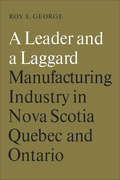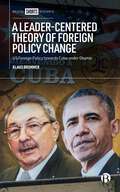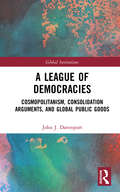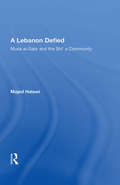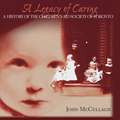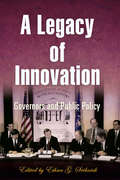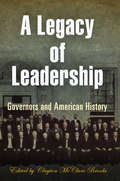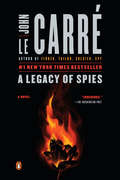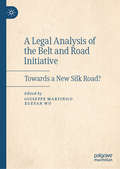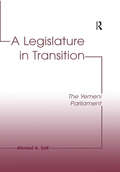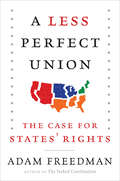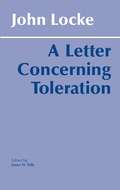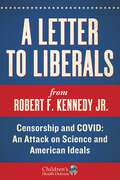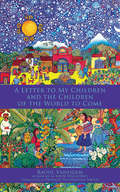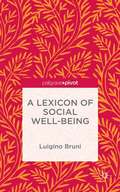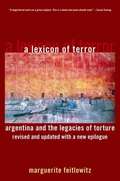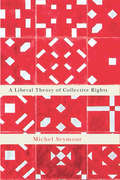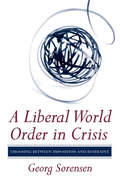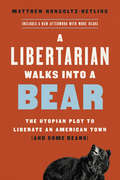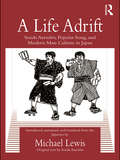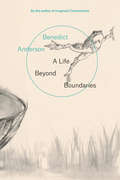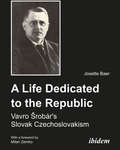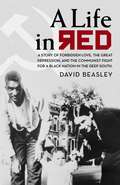- Table View
- List View
A Leader and a Laggard: Manufacturing Industry in Nova Scotia, Quebec and Ontario
by Roy GeorgeAdvanced countries in all parts of the world are concerned with the geographical unevenness of their development. Canada's preoccupation is with the Atlantic provinces, and for years government departments and agencies have tried to improve the region's economy. However, the evidence suggests that the economic gap between the Atlantic provinces and the rest of Canada has remained remarkably constant. This persistent gap has no shortage of explanations: lack of resources, the cost of transportation, insufficient markets, and a poor supply of skilled labour are problems often mentioned. This study investigates how far these and other factors account for slow industrial development. The author compares two regions of Canada: Quebec and Ontario, which together are considered the industrial leader; and Nova Scotia, the industrial laggard. He compares the costs of inputs for an average manufacturing firm in Nova Scotia from 1946 to 1962 with what those costs would have been had the firm been located in the Quebec-Ontario region. The analysis includes relative wage rates, labour productivity, the costs of materials, energy, and fuel, rates of interest and investment, transportation charges, levels of local taxation, and the supply of business enterprise. Canadian official statistics form the main basis of the comparisons, but where these are inadequate, information derived from three special studies carried out by the author is used. Dr George then explores the implications of the study's findings for public policy. He examines the relative cost and effectiveness of tax concessions, capital grants, industrial estates, transportation subsidies, and other remedial measures often advocated. Although the book uses a case study approach involving just two regions, it is relevant to the general theory of the location of industry, to regional economic policies, and to industrial development. It is essential reading for politicians and public servants who shape regional policies; for industrial promotion managers of municipalities; for businessmen choosing sites of new enterprises, and the consultants who advise them; for academics concerned with the theoretical aspects of the location of industry; and for anyone interested in industrial development.
A Leader-Centered Theory of Foreign Policy Change: U.S. Foreign Policy toward Cuba under Obama
by Klaus BrummerForeign policy analysis is a major part of international relations scholarship, yet many models are ill-equipped to examine the effects of individual leadership on policy. Written by a leading figure in the field, this innovative account challenges traditional views in international relations by theorising the influence of individual leaders on foreign policy change. It examines how and why leaders have shaped policy throughout history, showcasing Obama's Cuba pivot as a prime example. Using an original theoretical approach, this book will appeal to academics and practitioners in foreign policy analysis, international relations and comparative politics.
A League of Democracies: Cosmopolitanism, Consolidation Arguments, and Global Public Goods (Global Institutions)
by John J. DavenportIn the 21st century, as the peoples of the world grow more closely tied together, the question of real transnational government will finally have to be faced. The end of the Cold War has not brought the peace, freedom from atrocities, and decline of tyranny for which we hoped. It is also clearer now that problems like economic risks, tax havens, and environmental degradation arising with global markets are far outstripping the governance capacities of our 20th century system of distinct nation-states, even when they try to work together through intergovernmental agreements and organized bureaucracies of specialists. This work defends a cosmopolitan approach to global justice by arguing for new ways to combine the strengths of democratic nations in order to prevent mass atrocities and to secure other global public goods (GPGs). While protecting cultural pluralism, Davenport argues that a Democratic League would provide a legal order capable of uniting the strength and inspiring moral vision of democratic nations to improve international security, stop mass atrocities, assist developing nations in overcoming corruption and poverty, and, in time, potentially address other global challenges in finance, environmental sustainability, stable food supplies, immigration, and so on. This work will be of great interest to students and scholars of international relations, international organizations, philosophy and global justice.
A Lebanon Defied: Musa Al-sadr And The Shi'a Community
by Majed HalawiA Lebanon Defied focuses on the constitutive role of the Shi'a masses in the movement led by Sayyid Musa al-Sadr in Lebanon. It explores the origins of this Shi'a movement and its determination to become a major participant in a sharply reformed Lebanese polity. .
A Legacy of Caring: A History of the Children's Aid Society of Toronto
by Children'S Aid Foundation Gail Aitken Donald F. Bellamy John MccullaghBegun in 1891, the Children’s Aid Society of Toronto is the largest child welfare agency in North America. It has played a leading roll as an advocate of children’s welfare; it has been instrumental in influencing child welfare practice not only in Ontario but all of Canada and elsewhere. With an emphasis on the post-World War II period, A Legacy of Caring examines the political, social, and economic factors that led to changes within the society itself as well as developments in legislation and social policy. The society has been a training ground for many highly committed professionals who have gone on to be leaders in other governmental and nongovernmental agencies in Canada and abroad.
A Legacy of Innovation
by Ethan G. SribnickFrom La Follette to Faubus, from Rockefeller to Reagan, U.S. governors have addressed some of the most contentious policy questions of the twentieth century. In doing so, they not only responded to dramatic changes in the political landscape, they shaped that landscape. The influence of governors has been felt both within the states and across the nation. It is telling that four of the last five U.S. Presidents were former state governors.A Legacy of Innovation: Governors and Public Policy examines the changing role of the state governor during the "American Century." In this volume, top political scientists, historians, and journalists track the evolution of gubernatorial leadership as it has dealt with critical issues, including conservation, transportation, civil rights, education, globalization, and health care. As the most visible state officials, twentieth-century governors often found themselves at the center of America's conflicting political tendencies. A Legacy of Innovation describes how they negotiated the tensions between increasing democratization and the desire for expert control, the rise of interest groups and demise of political parties, the pull of regionalism against growing nationalism, and the rising demand for public services in a society that fears centralized government. In their responses to these conflicts, governors helped shape the institutions of modern American government.As state governments face new policy challenges in the twenty-first century, A Legacy of Innovation will serve as a valuable source of information for political scientists and policy makers alike.
A Legacy of Leadership
by Clayton Mcclure BrooksIn A Legacy of Leadership, top scholars and journalists create a new framework for understanding the contributions governors have made to defining democracy and shaping American history.Structured chronologically, A Legacy of Leadership places governors in contrast and comparison with one another as well as within the context of their times to show how a century of dramatic developments--war and peace, depression and prosperity--led governors to rethink and expand their positions of leadership. The nine chapters of compelling new scholarship presented here connect the experiences of dynamic individual governors and the evolution of the gubernatorial office to the broader challenges the United States has faced throughout the turbulent twentieth century. Taken together, they demonstrate how interstate cooperation became essential as governors increasingly embraced national and international perspectives to promote their own states' competitiveness.Published for the centennial of the National Governors Association, A Legacy of Leadership is an eloquent demonstration of how, to a great extent, we live in a country that governors created.
A Legacy of Spies
by John Le CarréThe undisputed master returns with a riveting new book—his first Smiley novel in more than twenty-five years Peter Guillam, staunch colleague and disciple of George Smiley of the British Secret Service, otherwise known as the Circus, is living out his old age on the family farmstead on the south coast of Brittany when a letter from his old service summons him to London. The reason? His Cold War past has come back to claim him. Intelligence operations that were once the toast of secret London, and involved such characters as Alec Leamas, Jim Prideaux, George Smiley and Peter Guillam himself, are to be scrutinized by a generation with no memory of the Cold War and no patience for its justifications.Interweaving past and present so that each tells its own intense story, John le Carré has spun a single plot as ingenious and thrilling as the two predecessors on which it looks back: The Spy Who Came in from the Cold and Tinker, Tailor, Soldier, Spy. In a story resonating with tension, humor and moral ambivalence, le Carré and his narrator Peter Guillam present the reader with a legacy of unforgettable characters, old and new.
A Legal Analysis of the Belt and Road Initiative: Towards a New Silk Road?
by Giuseppe Martinico Xueyan WuWhat does the Belt and Road Initiative mean for the existing multilateral organisations? What can it represent for the future of the European Union in the long run? What is the role of hard and soft law in the functioning of the Initiative? What does it represent from a legal theory perspective? This book aspires to contribute to the international debate by gathering scholars with different backgrounds (legal theorists, public international lawyers, comparative lawyers) in a way that they can offer their inputs and observations concerning the Belt and Road Initiative.
A Legal History of the Civil War and Reconstruction
by Laura F. EdwardsAlthough hundreds of thousands of people died fighting in the Civil War, perhaps the war's biggest casualty was the nation's legal order. A Nation of Rights explores the implications of this major change by bringing legal history into dialogue with the scholarship of other historical fields. Federal policy on slavery and race, particularly the three Reconstruction amendments, are the best-known legal innovations of the era. Change, however, permeated all levels of the legal system, altering Americans' relationship to the law and allowing them to move popular conceptions of justice into the ambit of government policy. The results linked Americans to the nation through individual rights, which were extended to more people and, as a result of new claims, were reimagined to cover a wider array of issues. But rights had limits in what they could accomplish, particularly when it came to the collective goals that so many ordinary Americans advocated. Ultimately, Laura F. Edwards argues that this new nation of rights offered up promises that would prove difficult to sustain.
A Legislature in Transition: The Yemeni Parliament
by Ahmed A. SaifLegislatures are vital to new democracies and to date no democracy has survived without one. Exploring the dynamics and mechanisms that facilitate or weaken the role of the Parliament, Ahmed Abdul Kareem Saif reinforces the importance of placing the Parliament in a context that shows how it reflects its socio-political surroundings. A detailed analysis of the development of the elected legislative body in Yemen, from its establishment after unification in 1990, this work enables researchers to clearly identify not only the similarities between societies, but also the crucial differences.
A Less Perfect Union: The Case for States' Rights
by Adam Freedman“How Washington elites have effectively staged a coup against the sovereign states, usurping powers that were never intended for the central government.” —Mark R. Levin, #1 New York Times-bestselling authorIn A Less Perfect Union, Adam Freedman provides an illuminating history of states’ rights, from the Constitutional Convention through the Civil War and the New Deal to today. He reveals how hard the Founders fought to keep power in the hands of the states, the surprising role of states’ rights as a weapon against slavery, and the federal government’s eventual abandonment of all constitutional limitations on the scope of its power. Surveying the latest developments in Congress and the state capitals, he finds a growing sympathy for states’ rights on both sides of the aisle, as the federal government usurps more and more control.But Freedman goes further, boldly arguing that a return to states’ rights is the only way to check the tyranny of federal overreach, take power out of the hands of the special interests and crony capitalists in Washington, and realize the Founders’ vision of freedom. With concrete policy proposals, A Less Perfect Union lays out an achievable vision of a nation in which states are free to address the health, safety, and economic well-being of their citizens without federal coercion and crippling red tape.As states’ rights issues continue to drive the national conversation, A Less Perfect Union is essential reading for anyone frustrated by the federal government’s daily infringement of the quintessentially American right of local self-government.
A Letter Concerning Toleration
by John Locke James H. TullyJohn Locke's subtle and influential defense of religious toleration as argued in his seminal Letter Concerning Toleration (1685) appears in this edition as introduced by one of our most distinguished political theorists and historians of political thought.
A Letter to Liberals: Censorship and COVID: An Attack on Science and American Ideals (Children’s Health Defense)
by Robert F. Kennedy Jr.A leading Democrat challenges his party to return to liberal values and evidence-based science Democrats were the party of intellectual curiosity, critical thinking, and faith in scientific and liberal empiricism. They once took pride in understanding how to read science critically, exercising healthy skepticism toward notoriously corrupt entities like the drug companies that brought us the opioid crisis, and were outraged by the phenomenon of &“agency capture&” and the pervasive control of private interests over Congress, the media, and the scientific journals. During the COVID pandemic, these attitudes have taken a back seat to blind faith in government mandates and countermeasures driven by pharmaceutical companies and captive federal agencies, promoted by corporate media, and cynically exploiting the fears of the American people. A Letter to Liberals is Robert F. Kennedy Jr.&’s, challenge to &“lockdown liberalism&’s&” embrace of policies that are an affront to once cherished precepts. Kennedy invites readers to look at the data in order to answer questions such as:Did COVID vaccines really save millions and end the pandemic?Why were the lowest COVID death rates in countries and states that relied on therapeutic drugs, and in countries with the lowest vaccination rates?Did vaccines prevent infection or transmission as officials promised?Why do COVID vaccines appear to show &“negative efficacy&”—making the vaccinated more susceptible to COVID.Why does the most reliable data suggest that COVID vaccines do not lower the risk of death and hospitalization.Should government technocrats be partnering with media and social media titans to censor and suppress the questioning of government policies?And why have so many liberals abandoned fundamental Constitutional principles in their headlong rush to embrace pandemic policies pushed by captured bureaucrats, feckless politicians, a compromised news media, and Big Pharma?In his November 2021 book The Real Anthony Fauci, which sold over 1,000,000 copies, Kennedy made predictions that have matured from &“conspiracy theories&” to proven facts. Among these: Masks Are Ineffective and DangerousSocial Distancing Was Not Science-BasedSchool Closures Were Not Science-BasedLockdowns Were CounterproductiveVaccinating Children Causes More Harm and Death Than It AvertsOfficials Wrongly Used PCR Tests to Justify the CountermeasuresCOVID-19 May Have Come from Wuhan LabNatural Immunity is Superior to Vaccine Immunity Kennedy throws down the gauntlet for the kind of vigorous scientific debate that liberals have long stood for and strives to ensure that unbiased honesty and well-researched thought is brought to bear on one of the most important and still unfolding chapters in human history.
A Letter to My Children and the Children of the World to Come
by Donald Nicholson-Smith John Holloway Raoul VaneigemSome 35 years after the May 1968 “events,” this short book poses the question of what kind of world we are going to leave to our children. A Letter to My Children and the Children of the World to Come provides a clear-eyed survey of the critical predicament into which the capitalist system has now plunged the world. At the same time, in true dialectical fashion, Vaneigem discerns all the signs of “a new burgeoning of life forces among the younger generations, a new drive to reinstate true human values, to proceed with the clandestine construction of a living society beneath the barbarity of the present and the ruins of the Old World.”
A Lexicon of Social Well-Being
by Luigino BruniWe must quickly learn how to live well in the world as it is today, including the realm of work. We need to learn a new vocabulary of economics and markets that is more suitable to understand the present world and that is likely to offer us the tools to act, and perhaps improve it as well.
A Lexicon of Terror: Revised and Updated with a New Epilogue
by Marguerite FeitlowitzThis updated edition features a new epilogue that chronicles major political, legal, and social developments in Argentina since the book's initial publication. It also continues the stories of the individuals involved in the Dirty War, including the torturers, kidnappers and murderers formerly granted immunity under now dissolved amnesty laws.
A Liberal Theory of Collective Rights (Democracy, Diversity, and Citizen Engagement Series #2)
by Michel SeymourMost states are multination states, and most peoples are stateless peoples. Just as collectives can behave as sovereign states only if they are recognized by the international community, liberal multination states must recognize stateless peoples in order to determine their political status within that state. There is, however, no agreement on the kind of principles that should be considered, especially under classical liberalism, which gives individuals preeminence over groups. Liberal theories that attempt to accommodate collective rights are often based on a comprehensive version of liberalism that subscribes to moral individualism. Within such a framework, they develop a watered-down concept of collective rights. In A Liberal Theory of Collective Rights Michel Seymour explores the theoretical resources of John Rawls’s political liberalism and shows that this particular approach can accommodate genuine collective rights. By Rawls’s account, Seymour explains, peoples are moral agents and sources of valid moral claims and are therefore entitled to collective rights. These kinds of rights translate, in the constitution of the multination state, to a true political recognition for stateless peoples. Ultimately, A Liberal Theory of Collective Rights answers three important questions: Who is the subject of collective rights? What is the object of collective rights? And can they be institutionalized in real politics?
A Liberal World Order in Crisis: Choosing between Imposition and Restraint
by Georg SørensenThe collapse of the bipolar international system near the end of the twentieth century changed political liberalism from a regional system with aspirations of universality to global ideological dominance as the basic vision of how international life should be organized. Yet in the last two decades liberal democracies have not been able to create an effective and legitimate liberal world order. In A Liberal World Order in Crisis, Georg Sorensen suggests that this is connected to major tensions between two strains of liberalism: a "liberalism of imposition" affirms the universal validity of liberal values and is ready to use any means to secure the worldwide expansion of liberal principles. A "liberalism of restraint" emphasizes nonintervention, moderation, and respect for others. This book is the first comprehensive discussion of how tensions in liberalism create problems for the establishment of a liberal world order. The book is also the first skeptical liberal statement to appear since the era of liberal optimism—based in anticipation of the end of history—in the 1990s. Sorensen identifies major competing analyses of world order and explains why their focus on balance-of-power competition, civilizational conflict, international terrorism, and fragile states is insufficient.
A Libertarian Walks Into a Bear: The Utopian Plot to Liberate an American Town (And Some Bears)
by Matthew Hongoltz-Hetling"Simultaneously hilarious, poignant, and deeply unsettling." ―The New RepublicA tiny American town's plans for radical self-government overlooked one hairy detail: no one told the bears. Once upon a time, a group of libertarians got together and hatched the Free Town Project, a plan to take over an American town and completely eliminate its government. In 2004, they set their sights on Grafton, NH, a barely populated settlement with one paved road. When they descended on Grafton, public funding for pretty much everything shrank: the fire department, the library, the schoolhouse. State and federal laws became meek suggestions, scarcely heard in the town's thick wilderness. The anything-goes atmosphere soon caught the attention of Grafton's neighbors: the bears. Freedom-loving citizens ignored hunting laws and regulations on food disposal. They built a tent city in an effort to get off the grid. The bears smelled food and opportunity.A Libertarian Walks Into a Bear is the sometimes funny, sometimes terrifying tale of what happens when a government disappears into the woods. Complete with gunplay, adventure, and backstabbing politicians, this is the ultimate story of a quintessential American experiment -- to live free or die, perhaps from a bear.
A Life Adrift: Soeda Azembo, Popular Song and Modern Mass Culture in Japan (Routledge Contemporary Japan Series)
by Soeda Azembo Michael Lewis (Translator)A Life Adrift, the memoir of balladeer-political activist Soeda Azembo (1872-1944), chronicles his life as one of Japan’s first modern mass entertainers and imparts an understanding of how ordinary people experienced and accommodated the tumult of life in prewar Japan. Azembo created enka songs sung by tenant farmers in rural hinterlands and factory hands in Tokyo and Osaka. Although his work is still largely unknown outside Japan, his poems and lyrics were so well known at his career’s peak that a single verse served as shorthand expressing popular attitudes about political corruption, sex scandals, spiralling prices, war, and love of motherland. As these categories attest, he embedded in his songs contemporary views on class conflict, gender relations, and racial attitudes toward international rivals. Ordinary people valued Azembo’s music because it was of them and for them. They also appreciated it for being distinctively modern and home-grown, qualities rare among the cultural innovations that flooded into Japan from the mid-nineteenth century. A Life Adrift stands out as the only memoir of its kind, one written first-hand by a leader in the world of enka singing.
A Life Beyond Boundaries: A Memoir
by Benedict AndersonAn intellectual memoir by the author of the acclaimed Imagined Communities Born in China, Benedict Anderson spent his childhood in California and Ireland, was educated in England and finally found a home at Cornell University, where he immersed himself in the growing field of Southeast Asian studies. He was expelled from Suharto's Indonesia after revealing the military to be behind the attempted coup of 1965, an event which prompted reprisals that killed up to a million communists and their supporters. Banned from the country for thirty-five years, he continued his research in Thailand and the Philippines, producing a very fine study of the Filipino novelist and patriot José Rizal in The Age of Globalization. In A Life Beyond Boundaries, Anderson recounts a life spent open to the world. Here he reveals the joys of learning languages, the importance of fieldwork, the pleasures of translation, the influence of the New Left on global thinking, the satisfactions of teaching, and a love of world literature. He discusses the ideas and inspirations behind his best-known work, Imagined Communities (1983), whose complexities changed the study of nationalism. Benedict Anderson died in Java in December 2015, soon after he had finished correcting the proofs of this book. The tributes that poured in from Asia alone suggest that his work will continue to inspire and stimulate minds young and old.From the Hardcover edition.
A Life Dedicated to the Republic
by Josette BaerJosette Baer retraces the eventful life of Slovak politician Vavro ?robár, the principal figure in the implementation of Czechoslovak democracy in Slovakia. From his student days and fight for Slovak civil rights in Upper Hungary to his active resistance to German fascism, ?robár shaped Czechoslovakia's turbulent history in the first half of the twentieth century. Baer's comprehensive biography makes archived materials available to English-speaking audiences for the first time and offers unique insight into Czechoslovakia's underresearched political history.
A Life Dedicated to the Republic: Vavro Srobár's Slovak Czechoslovakism
by Josette BaerJosette Baer retraces the eventful life of Slovak politician Vavro Šrobár, the principal figure in the implementation of Czechoslovak democracy in Slovakia. From his student days and fight for Slovak civil rights in Upper Hungary to his active resistance to German fascism, Šrobár shaped Czechoslovakia's turbulent history in the first half of the twentieth century. Baer's comprehensive biography makes archived materials available to English-speaking audiences for the first time and offers unique insight into Czechoslovakia's underresearched political history.
A Life In Red
by David BeasleyA Life in Red reveals the true story of star-crossed lovers Herbert Newton, a black communist seeking the end of an oppressive America, and Jane Newton, the white daughter of a wealthy American Legion commander, and their part in the Depression-Era, communist fight for a black sovereign nation.
